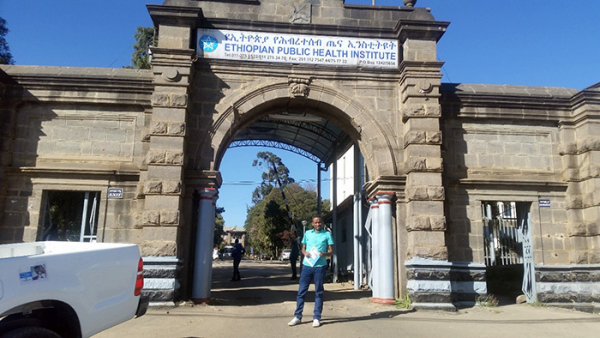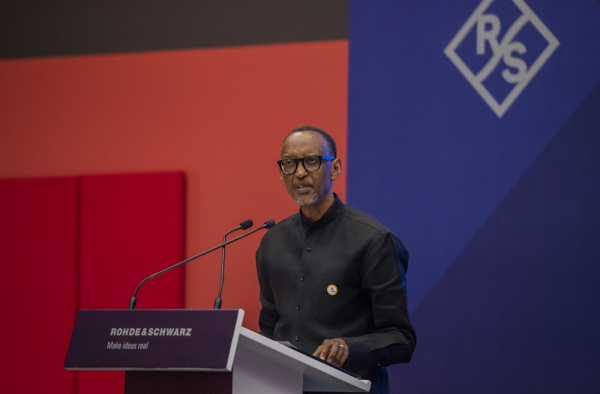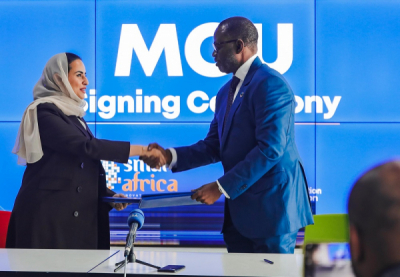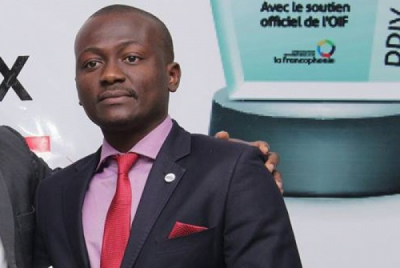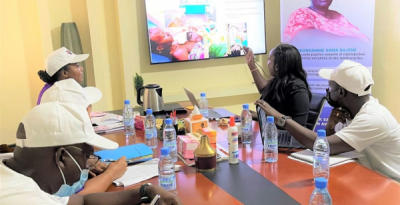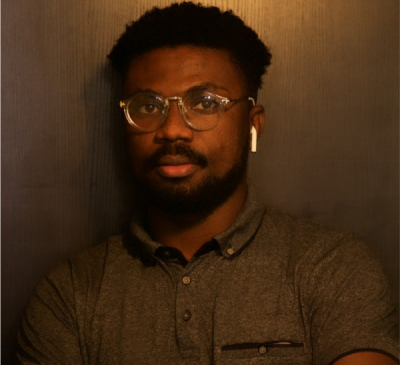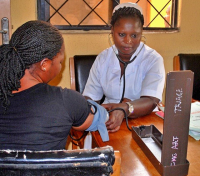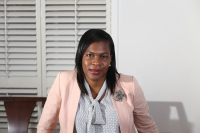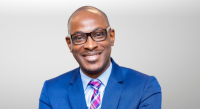The platform aims to enhance the general public’s preparation for timely decisions in case of health crises because it is the foundation for efficient crisis management.
The Ethiopian Public Health Institute (EPHI) launched Tuesday (June 7), a digital public health emergency contact platform accessible by calling 8335. Developed by the Ministry of Innovation and Technology and the Mastercard Foundation, it provides critical health information, notably regarding Covid-19, yellow fever, cholera, Guinea worm, and monkeypox outbreaks.
“In addition to providing health information, this digital technology responds to frequently asked questions through Interactive Voice Response (IVR). This significantly reduces the time health professionals at the contact center would take to respond to inquiries. The fact that the system receives and delivers messages quickly enables the provision of information to be delivered more efficiently and simply,” explains State Minister for Information Technology Huria Ali.
According to a release from the Mastercard Foundation, the “system greatly enhances the country’s current health system.” “The platform provides and receives public health information from the COVID-19 portal and District Health Information System 2 (DHIS-2), as well as other relevant data systems,” it adds explaining that the involved parties are committed to improving the platform for timely and reliable services.
“With this new digital service, the public will be able to make more informed decisions about their health. In addition, lessons learned from this digital platform will further contribute to our digital work across various portfolios. By leveraging the power of technology, we will achieve increased efficiency and connectedness across Ethiopia,” indicates Samuel Yalew Adela, Mastercard Foundation’s country head.
Ruben Tchounyabe
The new center is in line with the ambition of Rwandan President, Paul Kagame, to make the country Africa’s tech hub. It is the German group’s first subsidiary in Africa.
German electronics group Rohde & Schwarz opened its new software development lab in Kigali, Rwanda, last Monday (June 6). The lab was inaugurated during a ceremony attended by Rwandan President, Paul Kagame, on the sidelines of the 2022 ITU World Telecommunication Development Conference.
The recently inaugurated lab is both the Munich-based company's first subsidiary and research and development site in Africa. In the continent, the German group renowned worldwide for investments in future technologies (the 6G, quantum tech, IIoT, and AI) used to only carry out commercial activities.
Rohde & Schwarz will continuously expand the new laboratory as it did for its Singapore subsidiary, which has become a major Asian hub over the past 25 years. It will notably expand the scope of its operations to include cybersecurity and support to local students and engineers.
“Africa is an enormous growth market and Rwanda is a trailblazer in digitalization. Rohde & Schwarz is making a long-term commitment for sustainable growth and stability. We want to develop products for the global market together with our team in Rwanda,” said Peter Riedel President and COO of Rohde & Schwarz
Ruben Tchounyabe
With the memorandum, the two parties intend to join forces for effective digital actions. It demonstrates their understanding of the likely failure of unconcerted actions.
Smart Africa Alliance and the Digital Cooperation Organization inked, Monday (June 6), a memorandum of understanding to accelerate digital transformation in Africa. Under the memorandum, the two parties notably intend to exchange digital solutions and knowledge, create a commercial environment conducive to the development of innovative firms and empower women, the youth, and innovative entrepreneurs.
The intended actions will complement the measures already taken by Smart Africa Alliance and DCO member countries to boost connectivity (a basic requirement for effective digital transformation), accelerate digitalization in strategic socio-economic sectors, develop local digital talents and facilitate digital inclusion by 2030.
According to Lacina Koné (photo, right), CEO of Smart Africa Alliance, the MoU “will increase a lot to south-south cooperation, specifically with the Gulf Cooperation Council (GCC) countries.” He praised the partnership with a “like-minded organization” with whom the Smart Africa Alliance can collaborate on common objectives to enhance the growth of member countries’ economies.
As for Deemah Alyahya (photo, left), DCO Secretary-General, she expressed her belief “in the power of collaboration with like-minded organizations to enable digital prosperity for all.”
“We are very excited to activate our relationship and partnership. The digital economy is very fast in growth. We expected that by 2030, it is going to be more than 25 percent of the global GDP and now we know that by 2030, it is going to be 70 percent of the global GDP,” she added.
The memorandum was signed on the sidelines of the 2022 ITU World Telecommunication Development Conference currently being held in Kigali, Rwanda. The conference, which opened on June 6, will end on July 16. Smart Africa Alliance is a network of 32 African countries that share the common goal of leveraging the digital sector for development on the continent. Similarly, the Digital Cooperation Organization was founded by Bahrain in 2020 to facilitate a global and inclusive digital economy. Its membership includes Bahrain, Jordan, Kuwait, Nigeria, Oman, Pakistan, and Saudi Arabia.
Ruben Tchounyabe
With a passion for technology and its disruptive power, he surrounded himself with tech talents to implement innovative and impactful projects.
Cameroonian entrepreneur Vincent Onana Binyegui (photo) is the designer and developer of the solar-powered educational tablet Teachmepad. He distributes the tablets through his startup Teachmepad Mobile Limited, founded in 2016.
With Teachmepad, he guarantees quality education to every child, notably in rural areas where access to the internet and electricity remains a real challenge. Thanks to Teachmepad tablets, children can access educational content, like Wikipedia, offline.
The tablets were launched to address some of the problems Vincent identified in 2014, during his field research works in the Central African Region when he was still studying at the International Relations Institute of Cameroon (IRIC). The notable problem he identified was a shortage of teachers in remote areas, where thousands of children are thus deprived of basic education. He then vowed to address the problems using technology. “Teachmepad is a tablet we built to address several challenges facing education in remote areas; notably poor access to the internet, educational contents and electricity, and a shortage of schools,” he explains.
Vincent has a technician certificate in Banking and Finance, a Bachelor of Management Studies, and a Master's in international relations. He started his professional career in 2008 with two consecutive internships at Company Press and Publishing Cameroon (SOPECAM) and LeSage Cameroon (from 2010 to 2011).
He then dived into the entrepreneurship world in 2012 by co-founding Chartered Finance & Co., a business development and investment firm. In 2014, he launched VOB Research, a startup whose mission is to find tangible solutions to problems encountered by Africans in their daily lives- through technology.
His positive impact on the strategic education sector -thanks to Teachmepad Mobile Limited- earned him multiple awards and recognitions. In 2016 he won the Grand Prize of Project Contest organized by DRIMP Youth Forum Foundation and the Bantu Prize of Innovation awarded by the Bantu Development Initiative. The following year, he was featured in Bonjour Idée's list of the Top 5 African Startups of the Year. He also won the Hackathon Award for the best start-up organized during the international forum on digital economy in Cameroon before winning the 2018 Prix Jeunesse de la Francophonie 35.35.
Melchior Koba
The Covid-19 pandemic highlighted the importance of having alternative solutions in key sectors of the economy. In Senegal, Njureel is helping improve access to healthcare.
Njureel is a Senegalese healthtech startup that allows remote access to healthcare via its eponymous digital platform. It was founded in 2019 after its founder, Awa Ndiaye lost one of her relatives to a lack of proper healthcare.
Currently, the platform has no mobile app but users can easily register on its website using mainstream browsers and book teleconsultation with doctors. The consultations are held via Whastapp videocalls. The startup also offers psychological Tele counseling to violated women and legal guidance if necessary.
To educate women on sexual and reproductive health, Njureel developed a program called Sama Bajene. In the framework of the program, the startup claims to have trained more than 60 community health workers, carried out over 500 medical consultations, and impacted more than 800 women.
Since its launch in 2019, the healthtech has received numerous recognitions and awards. They include the Hack the Goals Senegal Award, the 2020 President of the Republic’s Grand Prize for digital innovation, the Innovation for mothers at risk in Senegal 2020 award, and the third prize for the Jigeen Ci-Tic competition.
Adoni Conrad Quenum
Budget management can quickly become cumbersome for teenagers living far from their parents. In Nigeria, entrepreneurs have addressed this issue by setting up an interesting alternative.
Sproutly is a Nigerian fintech startup that allows teenagers to open savings accounts with attached debit cards and parental supervision. The startup, founded in 2021, by Pierre Nwoke (photo), Maxwell Agu, and Prince Akachi, is based in the US and Nigeria.
Pierre Nwoke came up with Sproutly’s idea after he went through hell and high water to open a bank account for his underage brother who was preparing for university admission. “...it was one hell of a journey to open a savings account for him being underaged. We ended up doing so after one year and using one of my banks and my debit card for the entire period he was trying to open an account,” he explains.
Pierre discovered that it was a challenge faced by many. So, he decided to find a solution for it. “We took about three months researching pre-existing viable options and alternatives people use currently, like digital banks offering something close to what we wanted to build, and it was an amazing, eye-opening journey,” he told Disrupt Africa.
The startup has an Android and iOS app where teenagers can carry out their banking activities. It also has a mobile app to allow parents to monitor their kids’ spending and take preventive actions if needed. Sproutly also offers financial education and access to child-friendly loans and quick bailouts. The start-up is also developing additional services like school workshops to train children on financial management.
Adoni Conrad Quenum
In Africa, the stigmatization of HIV-positive people hinders the effective control and prevention of AIDS. In Nigeria, where nearly 1.9 million people are HIV-positive, technology has demonstrated its ability to improve their care.
Nigeria’s institute of human virology (IHVN) and healthtech startup Vantage Health Technologies revealed, Thursday (June 2), their successful implementation of an AI-powered project to keep HIV-positive people on effective and sustained treatment. Thanks to an AI-powered solution developed by Vantage, the IHVN was able to predict and “positively influence the behavior of high-risk HIV/AIDS patients.”
“The Patient Retention Solution is an AI-driven model that uses data from patient history to predict if patients will miss their next clinic appointment with the assumption that missing the appointment means the patient will drop off treatment as they are not present to collect their medication,” explains Annika Lindorsson Krugel, Solutions Manager of Vantage Health Technologies.
Once the prediction is completed, a list of the patients most likely to miss their appointments is transmitted to clinical staff who would then take action to prevent the likely outcome. They for instance call or send SMS to patients, and even visit the patients that do not have phones. Interviews are also carried out to provide psychological support to every at-risk patient before an appointment.
For Mercy Omozuafoh, Programme Manager for Care and Support with the IHVN, “the project has demonstrated the effectiveness of proactive tracking of Patients Living with HIV (PLHIV).” It “has made us understand the importance of interventions we are implementing,” she adds.
“The predictive model was rolled out to about 30,000 patients at the General Hospital Kudwa at Bwari in the Federal Capital Territory, the Dalhatu Araf Specialist Hospital in Lafia in the Nasarawa State, and General Hospital Ahoada in the Rivers State,” a press release informs.
“Our estimate shows that between 1.8 to 1.9 million Nigerians are currently living with HIV/AIDS. Of this number, 1.6 million are already on treatment. So, we have 300,000 more to go,” the national AIDS control agency NACA’s boss Dr. Gambo Gumel Aliyu told The Guardian ahead of World AIDS Day 2021.
According to the Joint United Nations Programme on HIV/AIDS (UNAIDS), one of the challenges in combating the epidemic in Africa remains keeping HIV-positive people on sustainable treatment. Also, according to a case study by Dartmouth Institute for Health Policy and Clinical Practice, the main barriers to treatment adherence “included stigma, side-effects, logistical challenges, economic barriers, and forgetfulness.”
“The study found that caregiver support, peer support, and understanding one’s status helped patients overcome these barriers,” it concluded (according to a release published by Vantage Health Technologies).
Ruben Tchounyabe
The fintech’s mission statement is “to enable lenders to unlock economic inclusion for African businesses and consumers.” With the funds secured, it plans to further the mission.
Nigerian fintech startup Indicina announced, Monday (June 6), the successful completion of a US$3 million seed funding round to accelerate African expansion. Led by tech investment firm Target Global, the operation had Greycroft and RV Ventures as participating investors.
According to Indicina co-founder Yvonne Johnson (photo), the Nigerian fintech wants “lenders to be better informed about the decisions around credit so they can go to market faster with their digital products.”
“So we’ve never had a business model that included our balance sheet, which we’ve always worked with the lenders,” she told Techcrunch.
Indicina was founded in 2018 by Carlos del Carpio, Jacob Ayokunle, Yemi Ajao, Yvonne Johnson. Apart from Nigeria, it is also present in Kenya. It offers machine learning solutions that improve individuals' and businesses’ chances to get access to credit. As company insight platform Crunchbase puts it, it “provides analytics-driven credit decisions for lenders.”
The fintech claims more than 100 active clients (lenders), which it helped process over NGN3 billion (US$7.2 million) loans and disburse over NGN700 million. Since its launch in 2018, Indicina has raised some US$7.2 million to upgrade its technology and hire more talents.
Adoni Conrad Quenum
The agency is created to improve the coherence of digital transformation projects ongoing in the country. The decision will help optimize resource utilization, they hope.
The Republic of Benin officially created, Wednesday (June 1), its national information technology development agency. The new agency, called ASIN -Agence des systèmes d’information et du numérique- is the result of the merger of four dedicated agencies. Those agencies are namely the digital development agency ADN, the information systems agency ASSI, the national cybersecurity agency ANSSI, and the Universal Service of Electronic Communications and Post (ABSU-CEP).
According to the government, the agencies were merged to answer optimization needs, in preparation for the operationalization of Société béninoise d’infrastructures numériques -the national digital infrastructure management firm-for improved efficiency, and for more rationality and coherence in state actions.
ASIN will pursue the actions carried out by its predecessors since its creation in 2016. It will notably implement digital projects like broadband and ultra-wideband deployment, dematerialization, cybersecurity, network extension, and the development of internet adoption in rural areas.
Placed under the dual supervision of the Ministry of Digital Affairs and Digitization and the Ministry of Economy and Finance, ASIN will be headed by André Loko (photo). Its board chairman is Finance Minister Romuald Wadagni.
Ruben Tchounyabe
The digital platform boasts of thousands of monthly users, therefore improving the visibility of registered artisans and informal workers.
In 2018, a new startup appeared in the Ivorian startup ecosystem networking users with artisans and informal workers. Dubbed “Mon Artisan” (Which literally means ‘My craftsman’ in French), it was founded by Kevin Sesse (photo), a business law graduate.
The startup specializes in household emergencies and renovation works, including interior design, plumbing, and gardening.
"My team and I give visibility to artisans and informal workers. We also help them access better work opportunities,” Kevin explains. The latter is a member of the Ivorian tech consortium Côte d'Ivoire Innovation 20 (Ci20) and a winner of the 2010 Gifted and Talented Pupils and Students IQ Award for his academic career. He began his professional career in July 2015 as a research assistant at Ipsos Abidjan. From February to August 2016, he was a trainer in the framework of Orange Côte d'Ivoire's Digital Homes program. Currently, he is a managing partner at consulting firm Social Tech Group.
His entrepreneurial career earned him several awards. In 2017, he was awarded the Alassane Ouattara Emerging Young Entrepreneur Award and the MTN Y'ello Start-up Award. The following year, he received the Deloitte Innovative Start-up Award, the Prix Jeunesse de la Francophonie in the technology category, and the African Entrepreneurship Award for Innovation. In 2019, he also won the RFI Challenge App Africa award.
Melchior Koba
More...
With that offer, Kenya hopes to support bitcoin miners’ green transition. According to Ecofin Agency, several crypto mining firms have already contacted KenGen with power requests.
Parastatal power producer Kenya Electricity Generating Company (KenGen) invites bitcoin mines to settle operations in Kenya. According to Ecofin Agency, which revealed the information recently, the power producer thus intends to monetize its geothermal power surplus and promote green crypto mining.
“We’ll have them here because We have the space and the power is near, which helps with stability,” said Peketsa Mwangi, KenGen’s geothermal development director.
Mr. Mwangi also revealed that some bitcoin mining companies have already approached the Kenyan company. "Their power requests vary, some of them had asked to start with 20MW to be later graduated... crypto mining is very energy-intensive," he added.
According to Kenyan news outlet The Standard, KenGen hopes to install bitcoin mining farms around its main geothermal power plant near Naivasha (123 km west of Nairobi). The country is Africa’s largest geothermal energy producer. Its production potential is about 14,000 MW but its installed capacity is 863 MW. Meanwhile, crypto mining firms are under pressure due to their high carbon emissions as they require an outstanding volume of energy to run their mining computers and equipment. Last year, several mining companies were expelled from China. Some of them are still looking for countries with excess supplies of renewable energy.
To add value to its economy, Morocco seeks new partnerships with international partners. Its agreement with HCL is highly strategic given its reputation as the best destination for outsourcing.
Indian multinational IT services and consulting company Hindustan Computers Ltd (HCL) will soon set up a “delivery center” in Morrocco. Indeed, last May 28, during her official visit to India, Moroccan Minister of Digital Transition, Ghita Mezzour, signed a memorandum of understanding with HCL.
According to a release from the Ministry of Digital Transformation, the memorandum states HCL’s ambition to offer high-value-added IT services to its global clients from the Morocco-based delivery center. The IT consulting company will focus notably on coding, software development, and training Morrocan talents. Ultimately, HCL plans to use Morrcoo as an outsourcing hub to conquer the African market.
“Morrocco's already high internet penetration rate is growing exponentially. The country, whose population can speak Arabic, has an educated and qualified workforce. Indian entrepreneurs can capitalize on the Moroccan population’s ability to speak French to reach African countries whose population mostly speak French,” Minister Mezzour said.
The government official’s visit to India was organized to enter into strategic partnerships with large firms. During her visit, Mezzour presented Morrocco as one of the three best outsourcing destinations in Africa because of its political stability, its commercial partnerships with European countries, and its trade openness in Africa.
Ruben Tchounyabe
With the E-customs project, authorities want to improve operational and financial efficiency, in line with the Nigerian government’s, which is to “improve services, lives, and revenues with digitalization.”
Nigeria recently launched a US$3.2 billion project that will quadruple monthly customs revenues. Dubbed the “E-customs” project, it consists of digitalizing the whole customs administration, including revenue collection. In that regard, stakeholders expect the project to help fetch US$176 billion in the next 20 years.
In the framework of the project, the Nigeria Customs Service signed, last May 30, a concession agreement with the Trade Modernization Project Limited, the project consortium formed by Africa Finance Corporation (AFC) and Huawei Technologies Limited.
With the E-customs project, financed by the AFC and implemented by Huawei, Nigerian authorities want to leverage digital tools to improve customs’ operational and financial efficiency.
“... we’re going to become a fully digitized Service. [...] The success of this project will be on the global map. We are going to hit the ground running. It’s a very beneficial project especially as it’ll garner $176 billion for the concession period. We are likely to surpass that,” said Mr. Hameed Ibrahim Ali, Comptroller General of the Nigeria Customs Service (NCS).
“To the Nigeria Customs, this is going to change the entire business process. It is going to put the Customs on the best part in terms of doing business. It would remove all arbitrariness and human mistakes … ease the cost of doing business…. assist those of us who were given the task to manage with a simpler process of managing and monitoring,” he added.
For Alhaji Saleh Ahmadu, chairman of the Trade Modernisation Project Limited, the e-customs project has several economic benefits. “As the concession period begins, we wish to assure Nigerians that the revenue target of 176 billion dollars for the Federal Government will be achieved, if not surpassed. [...] More importantly, we are excited about the real economic benefits for the country, in terms of business growth for exporters and import-dependent businesses. [...] Others are improved global supply chains, enhanced industrial capacity utilization, and creation of employment opportunities,’’ he indicated.
Ruben Tchounyabe
She chose to leverage technology to avoid preventable deaths caused by a lack of information. To fulfill her mission she created a universal health identification system dubbed Kea.
Vena Arielle Ahouansou (photo) is a Beninese doctor and entrepreneur. In 2017, she launched Kea Medicals, a startup providing universal health IDs to users. Via her platform Kea, she interconnects various health institutions allowing efficient healthcare to users no matter the health institution they visit. Indeed, attending physicians can check patients’ health records by imputing the latter’s universal IDs (previously provided by Kea) on the startup’s centralized platform. That way, it contributes to better diagnosis and treatment.
Arielle graduated from the University of Parakou's Faculty of Medicine (Benin) in 2017. During her medical internship, she witnessed many preventable deaths. The death of a woman named Charlotte was one too many.
"One evening, in Benin, I was on call at a referral hospital when Charlotte, a woman aged about 27, was referred. She delivered twins in a suburban hospital but, sadly she developed postpartum hemorrhage” and needed an urgent blood transfusion, she explains. The young mother died ten minutes after reaching the referral hospital because doctors had to check her blood type before the transfusion.
To ensure such preventable losses are averted, Arielle Ahouansou is focused on universal health identification. She is also active in several social projects. From 2014 to 2015, she served as the regional coordinator for the Health Sanitation and Hygiene Office, an organization that facilitates people's access to water and sanitation. One year earlier, she founded the non-governmental organization REFELD/MEN for women's empowerment and leadership development.
She is a Tony Elumelu Foundation Entrepreneurship Programme and GSMA Ecosystem Accelerator program fellow. In 2018, she was on Forbes Africa’s list of the 30 under 30 most promising African youths. The following year, she won the Paris Grand Prizes for Innovation.
Melchior Koba


